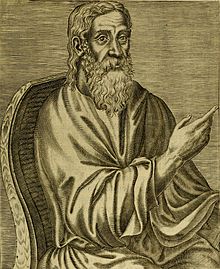
Back Clemens van Alexandrië Afrikaans إكليمندس الإسكندري Arabic اكليمندس السكندرى ARZ Clemente d'Alexandría AST Klement Azerbaijani Климент Александрийски Bulgarian Climent d'Alexandria Catalan Kléméns Alexandrijský Czech Clemens af Alexandria Danish Clemens von Alexandria German
Clement of Alexandria | |
|---|---|
 Clement depicted in 1584 | |
| Church Father, Theologian | |
| Born | Titus Flavius Clemens c. 150 AD Athens, Achaia, Roman Empire |
| Died | c. 215 AD Jerusalem, Syria Palaestina, Roman Empire |
| Venerated in | Oriental Orthodoxy Eastern Catholicism Anglican Communion |
| Canonized | Pre-congregation |
| Feast | 4 December (Eastern Catholicism, Anglicanism) 5 December (Episcopal Church, Anglicanism) |
| Controversy | Regarded as a heretic by Photius. |
Catholic cult suppressed | c. 1605 by Pope Clement VIII |
Philosophy career | |
| Other names | Clement Alexandrine |
| Notable work | |
| Era | |
| Region | Western philosophy |
| School | |
| Institutions | Catechetical School of Alexandria |
| Notable students | Origen and Alexander |
Main interests | Christian theology |
Notable ideas | |
|
Preview warning: Page using Template:Infobox philosopher with unknown parameter "influences" Preview warning: Page using Template:Infobox philosopher with unknown parameter "influenced" | |
| Part of a series on |
| Catholic philosophy |
|---|
   |
Titus Flavius Clemens, also known as Clement of Alexandria (Ancient Greek: Κλήμης ὁ Ἀλεξανδρεύς; c. 150 – c. 215 AD),[4] was a Christian theologian and philosopher who taught at the Catechetical School of Alexandria. Among his pupils were Origen and Alexander of Jerusalem. A convert to Christianity, he was an educated man who was familiar with classical Greek philosophy and literature. As his three major works demonstrate, Clement was influenced by Hellenistic philosophy to a greater extent than any other Christian thinker of his time, and in particular, by Plato and the Stoics.[5] His secret works, which exist only in fragments, suggest that he was familiar with pre-Christian Jewish esotericism and Gnosticism as well. In one of his works he argued that Greek philosophy had its origin among non-Greeks, claiming that both Plato and Pythagoras were taught by Egyptian scholars.[6]
Clement is usually regarded as a Church Father. He is venerated as a saint in Coptic Christianity, Eastern Catholicism, Ethiopian Christianity, and Anglicanism. He was revered in Western Catholicism until 1586, when his name was removed from the Roman Martyrology by Pope Sixtus V on the advice of Baronius. The Eastern Orthodox Church officially stopped any veneration of Clement of Alexandria in the 10th century.[citation needed] Nonetheless, he is still often referred to as "Saint Clement of Alexandria" by both Eastern Orthodox[7] and Catholic[8] authors.
- ^ Bromiley, Geoffrey William, ed. (October 29, 1979). The International Standard Bible Encyclopedia. Wm. B. Eerdmans. ISBN 978-0-80283781-3. Archived from the original on July 29, 2020. Retrieved December 31, 2019 – via Google Books.
- ^ Clement of Alexandria. "VI". Stromata. Vol. 6. Early Christian writings. Archived from the original on 2019-07-25. Retrieved 2019-08-03.
- ^ Van Den Hoek, A. (1988) Clement of Alexandria and his Use of Philo in the Stromateis. An Early Christian reshaping of a Jewish model, Suplements to Vigiliae Christianae 3, Leiden.
- ^ Buell (1999), p. 10.
- ^ Outler (1940), p. 217.
- ^ Press (2003), p. 83.
- ^ Ware, The Orthodox Church, 340; De Young, The Religion of the Apostles, 44; Spark, The Orthodox Study Bible, 1800.
- ^ Akin, The Fathers Know Best, 45, 52, 61, 73, 93, 141, 224, 354.
© MMXXIII Rich X Search. We shall prevail. All rights reserved. Rich X Search